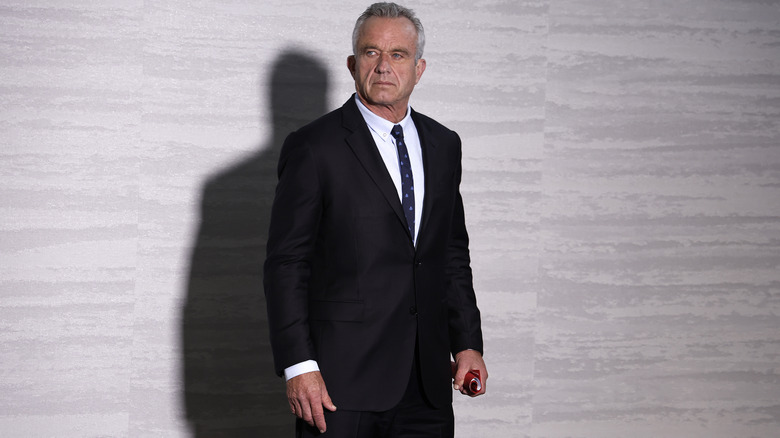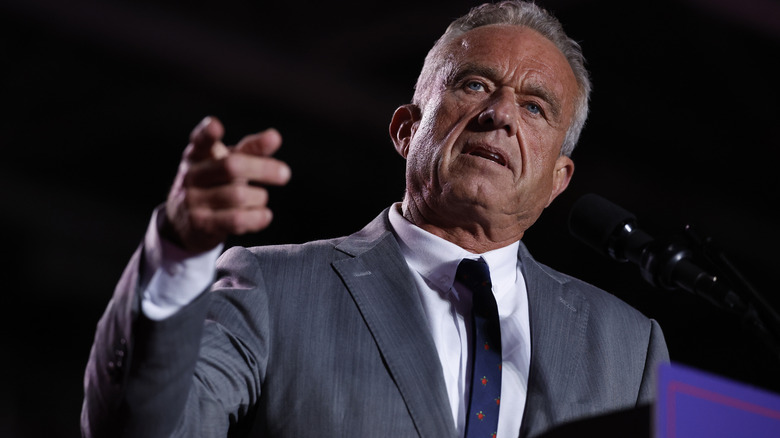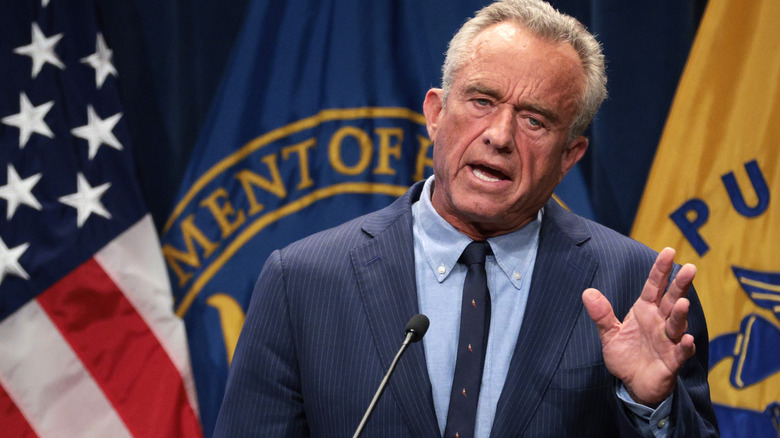All Of RFK Jr's Health Issues Explained
Robert F. Kennedy Jr. has weathered several tragedies, and some of them have had to do with his health. Kennedy, who has been appointed as the second Trump administration's health secretary has some, er, interesting ideas about what constitutes a healthy nation. Kennedy is a vaccine skeptic and has built his "Make America Healthy Again" mandate on claims that he will provide the nation with healthier food and tackle the root causes of chronic disease in children. Many have believed him to be something of a savior, someone with solutions to any health problem imaginable.
While Kennedy's intentions might be good, his methods are misguided. He's not a medical professional and has a tendency to buy into conspiracy theories and spread misinformation. Kennedy has questioned whether germs can actually make people sick, he's hinted that AIDS might have nothing to do with HIV, and he's insisted that vaccines aren't protecting kids — they're hurting them. None of his claims are backed up by science. In fact, science contradicts Kennedy's claims. "I think he's remarkably dishonest," Professor Paul Offit, a pediatrician and one of the inventors of the rotavirus vaccine, told the BBC.
Offit wasn't wrong. Fast-forward to 2025, and Kennedy and his team found themselves in hot water after they released a health commission report that eagle-eyed journalists quickly figured out was likely written by AI software after realizing it included citations to studies that didn't exist. Kennedy even boasted about those, saying this "gold-standard" report was supported by over 500 citations, per The Guardian. The citations AI hadn't invented have been criticized for having been misinterpreted to support Kennedy's false claims. As misguided as this might be, it's clear that Kennedy has a vested interest in human health, which is likely because he's had some health scares of his own.
Robert F. Kennedy Jr. was previously diagnosed with mercury poisoning
When RFK Jr. first contacted Professor Paul Offit, it was under the guise of reassuring worried parents that a former common preservative in vaccines called thimerosal doesn't harm kids. Thimerosal is mercury-based but hasn't proved dangerous as a vaccine preservative. In the end, Kennedy disregarded what Offit told him, writing a piece for Rolling Stone in which he claimed the preservative was indeed causing widespread health problems. The outlet later took down the article because of its many inaccuracies.
Funnily enough, Kennedy would find himself diagnosed with mercury poisoning years later, but it wasn't because of a vaccine — he'd gone a little too heavy on the tuna. According to Cleveland Clinic, people who heavily indulge in seafood that contains the metal can get mercury poisoning. This is a rare occurrence in the United States, however. Mercury buries itself in vital organs when large enough amounts accumulate inside the body. The immune system reacts, causing an array of symptoms that depend on the type of mercury poisoning. If it was caused by ingesting seafood, for instance, nausea and vomiting, diarrhea, changes in the color of your urine, blood in stool or vomit, and a burning sensation in the throat or stomach are common. Mercury poisoning is a medical emergency that needs prompt treatment. In some cases, it can cause chronic symptoms.
These days, Kennedy offers high praise for President Donald Trump, even as the divisive politician makes moves to do away with strict mercury regulations, something Kennedy vehemently opposed during Trump's first term. "The same chemicals that kill fish make people sick," Kennedy argued in 2017, per E&E News. Now, as a member of the Trump administration, he is silent as the grave.
He had a parasite in his brain
While RFK Jr. was divorcing his second wife, Mary Richardson Kennedy, he was trying to save some money, it seems, because he argued that his many health issues left him earning less than he would have had he been a healthy man. In his deposition, he said that doctors had found a worm in his brain and that he'd dealt with cognitive issues because of it. When doctors spotted something on Kennedy's brain scans, they thought it was cancer. One doctor, however, came up with a different theory, telling Kennedy the spot on his brain "was caused by a worm that got into my brain and ate a portion of it and then died," Kennedy said in his deposition (via The New York Times).
It turns out this doctor was partially right. The Times interviewed some experts in the field who believe Kennedy's brain worm was likely a tapeworm larva. That these parasites eat part of the brain is unlikely, however, as Dr. Clinton White, a professor of infectious diseases, told the outlet. Scott Gardner, curator of the Manter Laboratory for Parasitology at the University of Nebraska-Lincoln, said that the larvae often create a permanent tumor-like mass because brain cells calcify around the impostor.
The illness caused by tapeworms, officially known as cysticercosis, can lead to an array of nasty symptoms, depending on where the worm makes its home in the body. If it attaches itself to the nervous system, one can experience headaches, a stiff neck, nausea and vomiting, seizures, and confusion, according to Cleveland Clinic. Usually, the cysts the larvae causes can exist in the brain without any symptoms occurring. After it dies, however, symptoms usually start to present, which seems to have been the case for Kennedy.
Robert F. Kennedy Jr. dealt with brain fog and memory loss
In his 2012 divorce deposition, Kennedy said he was struggling with brain fog and had trouble remembering things. "I have cognitive problems, clearly. I have short-term memory loss, and I have longer-term memory loss that affects me," he said (via The New York Times). As Kennedy made a bid for the White House in 2024, his spokesperson addressed the report published by The Times, admitting to CBS News that Kennedy had indeed had cysticercosis and suspected he contracted it while traveling "extensively in Africa, South America, and Asia as his work as an environmental advocate." They added, "The issue was resolved more than 10 years ago, and he is in robust physical and mental health. Questioning Mr. Kennedy's health is a hilarious suggestion, given his competition."
Speaking to CBS News after news of Kennedy's brain worm made the rounds, Dr. Céline Gounder explained that his cognitive symptoms likely weren't the tapeworm's fault, noting that Kennedy had said he was diagnosed with mercury poisoning around the same time. "Between the parasite and the mercury, it's more likely the mercury," Gounder said. She added that it's possible for the body to heal itself when exposed to high levels of mercury. "It just really depends on how long, how high the exposure [was]," she said.
Kennedy, meanwhile, took to X to boast about his health, writing, "I offer to eat 5 more brain worms and still beat President Trump and President Biden in a debate." This comment didn't age all that well, given that Kennedy now works for Trump. Many thought Kennedy should rethink his endorsement of Trump after the president made some derogatory comments about him and his family, but he stood his ground and got a high-profile government job for his troubles.
He was previously hospitalized for an irregular heartbeat
RFK Jr. has dealt with his fair share of rare health issues, but one that wasn't quite as exotic was his diagnosis of atrial fibrillation, commonly known as AFib, a condition that occurs when the heart's upper chambers (the atria) go out of sync with the lower chambers (the ventricles). This leads to an irregular heartbeat, and patients often feel like their heart is fluttering in their chests or pounding uncontrollably. Shortness of breath, fatigue, weakness, lightheadedness, and chest pain are all common symptoms, according to the Mayo Clinic. AFib is a serious condition that can lead to a stroke if not treated.
In 2001, Kennedy was hospitalized for the condition. As he geared up to run as an Independent presidential candidate, Kennedy told The New York Times that the condition was under control and that he hadn't experienced the arrhythmia in over a decade, saying he believed he no longer suffered from the condition. While Kennedy might not have experienced symptoms in a while, it doesn't mean he's cured. No medical cure exists for the condition but it can be managed with a combination of lifestyle changes and medication.
Some people are born with AFib, but the condition can develop during one's lifetime due to conditions like high blood pressure, lung diseases like pneumonia, sleep apnea, heart valve disease, and even some viruses. Whether Kennedy was born with the disease or developed it later in life is unclear.
Robert F. Kennedy Jr. has spasmodic dysphonia
There have been myriad rumors about RFK Jr.'s health; from questions about his wobbly voice to rumors that his rock-hard abs are the result of steroid use. As he made more public appearances ahead of making his 2024 bid for the White House, Kennedy finally explained his rare voice to the public. The wobble was not because he was nervous about speaking in front of people, it was because of a condition called spasmodic dysphonia.
In the now-infamous divorce deposition published by The New York Times, Kennedy said he first noticed something amiss with his voice when he was 42, claiming the condition caused him to cut back on giving speeches, leading to a significant financial loss. Johns Hopkins Medicine notes that the exact cause of spasmodic dysphonia is still a mystery, but doctors suspect that it's caused by a central nervous system disorder, most specifically the area of the brain that regulates the movement of muscles. Those with the condition experience spasms in their vocal cords, making it hard to speak normally. In some cases, patients lose the ability to speak completely. No cure currently exists for the condition.
The disease manifests in three different forms: adductor spasmodic dysphonia (vocal cords involuntarily closing in on each other during speech), abductor spasmodic dysphonia (vocal cord spasms causing the muscles to move away from each other, making speaking almost impossible), and mixed spasmodic dysphonia (a combination of the two conditions). The last two are rare, and during an interview with VladTV, Kennedy explained that he had adductor spasmodic dysphonia, saying it used to be so severe that he often couldn't speak properly.
His spasmodic dysphonia negatively affected his self-esteem
Dealing with spasmodic dysphonia can be challenging, especially if you're a public figure who often delivers speeches. For Robert F. Kennedy Jr., his voice issues had a negative effect on his self-esteem. "I think it makes it problematical for people to listen to me," he told News Nation in 2023. "I cannot listen to myself on TV. I will never listen to this broadcast. ... I feel sorry for you guys having to listen to me." The diagnosis was especially hard for him because he used to have a pretty strong voice. During the interview, he reminisced about the days when he didn't even need a microphone to address a crowd. That all changed after he developed spasmodic dysphonia.
Johns Hopkins Medicine notes that many people with the disorder experience stress because of it and recommends therapy to help individuals deal with speech challenges. Speech therapy can help with symptoms, and even Botox injections can help the muscles to relax, reducing symptoms. Whether Kennedy has ever tried these treatments is unclear, but while speaking to VladTV, he said he underwent surgery in Japan in an attempt to get his voice back to normal. "[T]hey put a titanium bridge between your vocal cords to keep them separate so that air can pass through," Kennedy explained, saying the procedure he underwent is not yet available in the United States. He believes the surgery has helped him speak better, even though the wobble in his voice remains.
Cleveland Clinic notes that many healthcare professionals do not recommend surgery for the condition. It's invasive without guaranteed outcomes, and evidence that the surgery's benefits are worth the risks are lacking. Patients also often only experience short-term improvement before their voice goes back to the way it was pre-surgery.






